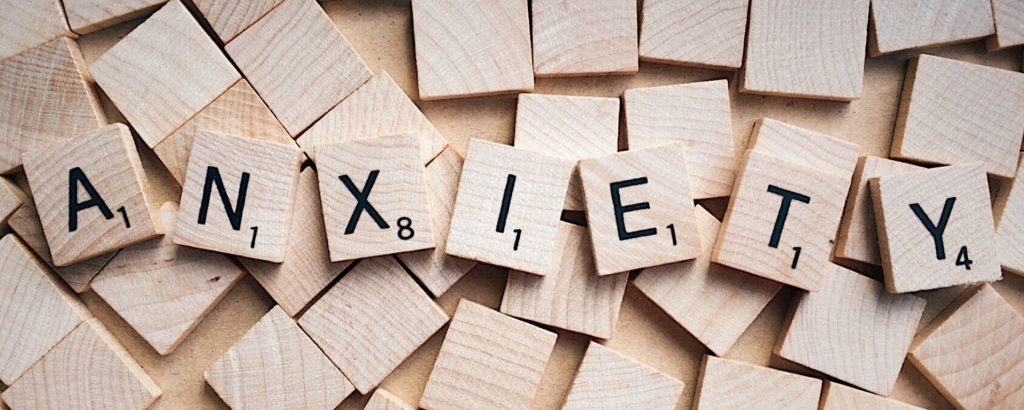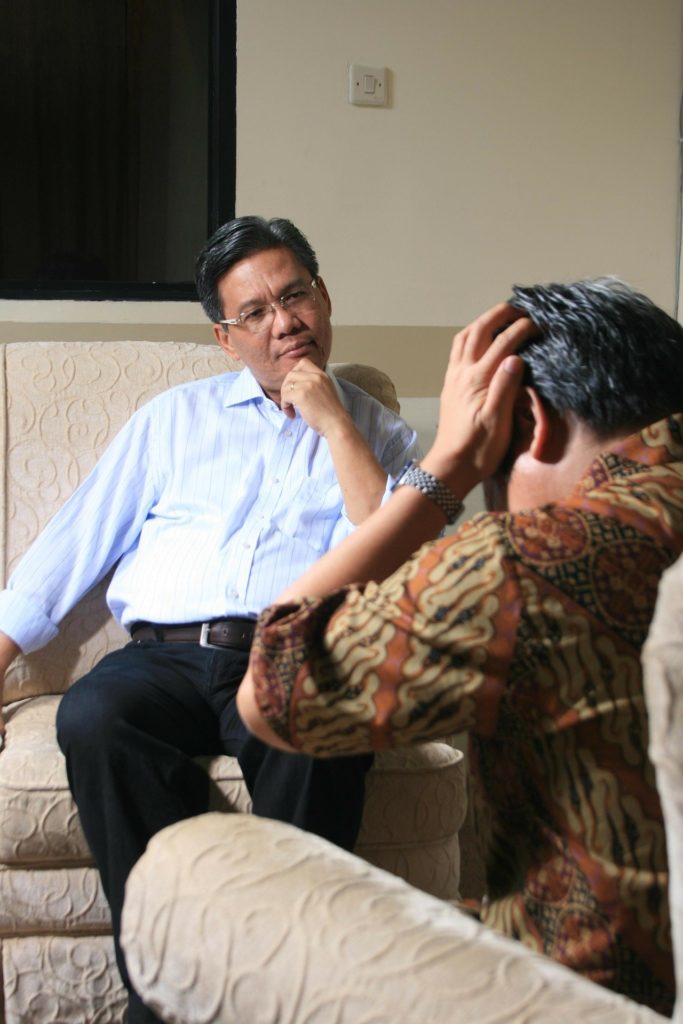What is Anxiety?
Anxiety was one of the most common mental health conditions before the COVID19 pandemic, and I can only imagine that it has exponentially increased over the last several weeks. Because anxiety is so common, it gets talked about a lot. Perhaps you are like me and occasionally hear conflicting opinions on anxiety and how followers of Christ are to respond to anxiety. The most common concern I hear Christians express about anxiety is questioning whether anxiety is a sin caused by a lack of trust in God. Ambiguity about the answer to that question can create shame for those experiencing anxiety, because they feel as if they have failed or are doing something wrong when their prayers or reading of Scripture do not alleviate their anxiety. When I personally approach the topic of anxiety, I prefer to start with looking at the biological mechanism of anxiety so I can understand the context in which anxiety takes place and how it fits in God’s creative handiwork.
To understand the function of anxiety, we are going to start with a big picture view of the brain. The brain is composed of two distinct systems called the parasympathetic and sympathetic nervous systems. To simplify this, I am going to call the parasympathetic system our ‘thinking brain’ and the sympathetic system our ‘threatened brain.’ On a typical day our thinking brain is the one that we use to direct our activities. It is thinking about our plans for the day, how our decisions will affect the future, and what options we have for lunch. When our brain starts to perceive a threat (aka something that is challenging our sense of homeostasis or ‘normal’), then the threatened brain comes online and we will go into either a fight, flight, feint, or freeze response. This threat response keeps us alive or shuts down our body so we don’t have to fully experience a horrific event. It helps us escape danger, fight our way out of a dangerous situation, or numb out in case we are unable to escape and fight our way out.

Okay, now we are going to dive a little deeper and look at something called the HPA Axis. The ‘H’ in this axis stands for the hypothalamus. The hypothalamus registers that there is a threat and starts a chain reaction by releasing chemicals that then activate the ‘P’ in the axis, which is the pituitary gland. The pituitary gland then sends additional chemicals to activate the adrenal system, which then releases cortisol. At this point, the heart beats faster and the body starts storing glucose (sugar) as fat cells to create energy reserves for massive expenditures of energy we may need to respond to the threat. It is common to also experience an upset stomach and less than solid bowel movements. The brain is essentially telling us “I am being attacked by a lion”, and we undergo rapid physiological changes to help us react to the threat. Biologically, this is what stress and anxiety are. They are the activation of the threatened brain to help us survive.
We Need Anxiety
It is a very good thing that we are designed with a threat response system. Without it we would not have a concern for our own survival. We would not care if we had no food or shelter. We would not have motivation to get up in the morning and go to a job. We wouldn’t care about the impact of our eating habits on our body or about saving for the future. In summary, we would be apathetic without the threat response system.
In Genesis we can see that God created humans with intentionality. It was not a random act, but one that was so carefully formulated that the Bible says in Genesis 1:26 God made humans in God’s image. In the very next chapter in 2:17 God tells Adam not to eat of the tree of good and evil or else Adam will die. Without a threat response and a hardwired survival mechanism, God’s warning would have had no meaning for Adam because he would not have cared about dying. It’s also important to note that God appealed to Adam’s survival instinct before sin entered the world. You also see that when Adam and Eve did eat from the tree, they hid (flight response).
Humans are capable of feeling stress and anxiety because God created us to be capable of feeling those things. If God meant for humans to be capable of feeling stress and anxiety, then I believe there must be a positive reason for it. As we understand the function of anxiety and God’s intentionality in creating humans, I am going to hypothesize that God wanted humans to care about their survival.

How much is too much?
Having too little to no anxiety results in apathy. But, if we look at the other side of the spectrum, we see that elevated anxiety leads to feeling overwhelmed. To describe this from a brain-based perspective, I would say that overwhelming anxiety is caused by a hyperactive sympathetic nervous system. To be more relatable, we could think about it as the equivalent of feeling stuck in rush hour traffic on I-15 with a full bladder and kids screaming in the backseat with no end in sight and without any chance for relief. What contributes to anxiety reaching this level to where it is overwhelming? It honestly is unique for each individual.
The threatened brain can be over-activated by chemical imbalances in the brain or the memories of past adverse experiences. It can also be caused by the effects of elevated inflammation or thinking tendencies. To take a big picture look at overwhelming anxiety, it may be appropriate to look at it as our threatened brain feeling sick because it is operating in a way that is negatively affecting us.
Common symptoms of overwhelming anxiety are:
- Difficulty controlling worry
- Negative impact on relationships, job, or school
- Irritability
- Sleep disturbance
- Fatigue
- Feeling hopeless
This is not a comprehensive list of symptoms, but just some of the most common symptoms.
If I am experiencing overwhelming anxiety, then what does that mean about me? Did I fail in some way? Does being overwhelmed with anxiety mean I don’t trust God enough? Let’s think about this. Using what we now know about anxiety, we can see that it is caused by an over-activation of our created (and good) threat response. Did we ask this system to be over-activated? Did we choose for it to happen? I see this as similar to getting a cold or breaking a leg. If my leg is broken then am I a failure if I can’t run? Do I need to trust in God more to be able to run with a broken leg?
I realize these questions I am posing are a little ridiculous, but I believe it is worth noting that just like having a broken leg or a cold is a biological issue, so also is the experience of overwhelming anxiety. Also, remember that we need some anxiety, and anxiety is a very normal part of being human. Overwhelming anxiety is not an indication of a moral or spiritual failure, but rather an indication of a normal biological mechanism that is biologically not optimally functioning.
Responding to Anxiety
I remember being in grade school and learning about early medical practices. One that particularly stands out to me is the use of leeches to treat certain medical conditions. I don’t remember exactly the thought behind the use of leeches, but I think it had something to do with the leeches sucking out the infection from a person. My point here is that no matter how well-intentioned you may be, you can do harm to yourself and others if you try to help in a way that misses the root of an issue. To heal a broken bone, you need a doctor to set the bone and to then wear a cast until the bone is knitted back together. You can’t just give someone a pain killer for the broken bone to manage the pain and then expect the person to be healed without setting the bone and getting a cast.
If we interpret anxiety as a lack of faith or some form of personal failing and then try to ‘fix’ the issue by increasing our faith and overcoming our weaknesses, then we will be expending a lot of effort to address something that is not causing the anxiety. This may actually increase anxiety because, when the anxiety persists after all of our efforts, we feel like even more of a failure to where the anxiety can become elevated.
I was at a conference last year and someone who was much smarter than me said that anxiety only exists in the future. Anxiety is the concern of what may happen or what I think is going to happen. Anxiety struggles to exist when we are grounded in the present. This brings to mind King David. If there was anyone in the Bible who experienced anxiety, it was certainly David. He was threatened by wild animals, hunted by Saul, made mistakes that impacted all of Israel, and was betrayed by those who were close to him. How did David respond to this? The Bible shows us that he sought out God and wrote music (often at the same time). I’m wondering what could ground a person to the present more than having a conversation with God and writing music?
Maybe you’re like me and aren’t inclined to write music. That’s okay. When do you feel present with God? I feel present with God when I am out in nature. It may be going for a walk or just sitting in front of a campfire. It’s in those settings where the future doesn’t seem like it’s as important and I feel drawn to the here and now. You’re different from me, so maybe it’s something else for you. Perhaps you feel in the present when you are serving someone or using your artistic gifts to express worship. Maybe you are more academically inclined and feel drawn to the present through study of the Scripture and developing your understanding of God and his teaching. As we enter into the present with God, it is harder to feel anxious:
Psalm 23 1The Lord is my shepherd, I shall not want. 2He makes me lie down in green pastures; He leads me beside quiet waters. 3He restores my soul;
I think that one of the most empowering statements a person can make is “I cause my own distress.” At first glance you may wonder why that would be empowering, but hear me out. Anxiety looks different for each person, because the root of the anxiety is different, whether it is a change to brain function from trauma or caused by the way we think. When talking about situations where anxiety is caused by our thinking, it is us who distress ourselves with our thoughts.
For example, if I believe that I must have approval for all or most things that I do, then I will likely feel anxious when I am in a situation where I could by under scrutiny such as turning in an assignment, having a performance review, or telling my spouse about my plans for the weekend. In those situations I am the one causing my distress because the situations of turning in an assignment, having a performance review, or talking to my spouse about my weekend plans are not intrinsically anxiety-producing situations in and of themselves. The situations become anxiety-producing for us because of how we think about them. So also, we distress ourselves when we believe in things that are in opposition to the Bible, such as believing that our kingdom is what matters most in life or that God is not with us. In these situations I would say that our anxiety is not the issue, but the issue is the beliefs or thoughts that are leading to the anxiety. The anxiety we feel may actually be positive in these situations because the anxiety is indicating to us that something is wrong. If we allow ourselves to lean into the anxiety rather than distract ourselves from it or push it down, then we can become confronted with the beliefs we are distressing ourselves with. Since we are the ones causing our distress, we can also be the ones to not distress ourselves as we identify and address the thoughts we are having.

Perhaps this all sounds good, but in your mind you know it will not be enough because you have already tried it. Anxiety is a spectrum. Most can typically regulate anxiety efficiently when we experience it in mild to moderate doses that are not chronic. If you are experiencing anxiety that is overwhelming, then it’s okay to seek additional help. No one would be shamed for seeking assistance with a broken leg, and there is no shame in seeking help with overwhelming anxiety. For you, anxiety may not just be infrequent occurrences of elevated stress. It may feel like a journey without an end in sight. As a member of the body of Christ, you are not alone. This journey does not have to be walked in solitude. You can reach out to Nathaniel, your small group leader, or an Elder in the church. If you need to see a therapist or a psychiatrist, then by all means please arrange to see someone who is professionally trained to treat anxiety. You may not have chosen to feel what you are feeling, but you do have a choice in how you respond to it.